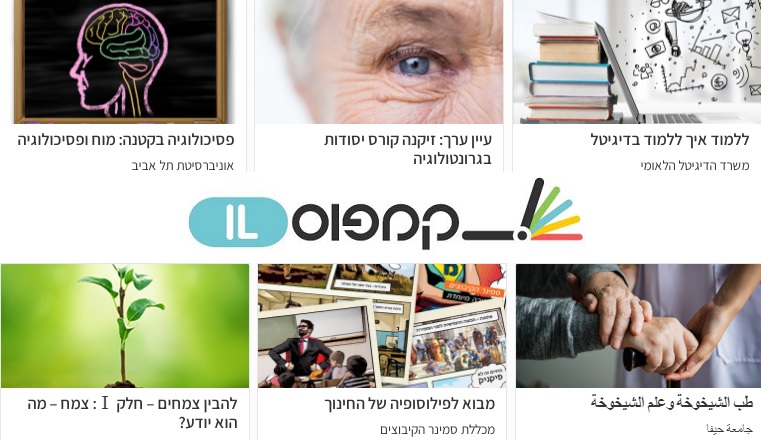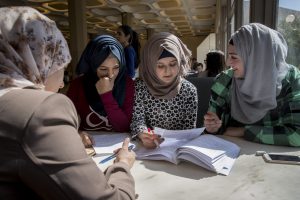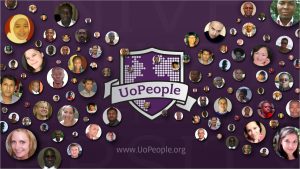Quality Education


Home » Quality Education » SDG 4- CampusIL — Quality and Equal learning opportunities for all
SDG 4- CampusIL - Quality and Equal learning opportunities for all
CampusIL is the flagship project of Digital Israel within The National Digital Ministry, powered by the international open-edX platform. The goal of CampusIL is to increase the public’s access to professional and academic education, while reducing socio-economic divides. CampusIL online courses allow all Israeli citizens from the center to the periphery to participate in courses anywhere, at any time, with just a device and an Internet connection. The learning experiences are personalized, with the best lecturers and teachers in their fields, and all for free.


CampusIL has been successful in its efforts to reach their target audiences in the margins of the country. For example, the average cost of a preparation course for the psychometric test in the private sector is NIS 7,000. With more than 60,000 enrollments and statistics that state the fact the average enrolled learner comes from a below-average socioeconomic background, Raviv says: “We have a significant instrument that saves a lot of money for the average citizen: 28% of all those taking a psychometric course studied from the CampusIL course. Large percentages of people from the periphery have signed up for the course. Today we have an understanding of the fact that our marketing campaign to reach the periphery has borne fruit,” explains Raviv. In fact, “most of the learners in CampusIL’ academic courses are not students (in the traditional sense of the word, i.e., students who pay tuition fees to an academic institute).”
This stellar achievement could almost have been lifted directly from the mandate of the UN’s sustainable development goal number 4 – Quality Education – target 3, which dictates: “By 2030, ensure equal access for all women and men to affordable and quality technical, vocational and tertiary education, including university.” CampusIL is certainly very close to reaching that target.
Another one of CampusIL’ goals is partnerships. At the moment CampusIL has partnerships with 25 other academic institutions, whose courses are now offered within the CampusIL online roster. “That is to say, enrolment in CampusIL courses is becoming more common and it is definitely growing and developing,” comments Raviv. The Ministry of Education, as well, offers courses in partnership with CampusIL. They now offer 140 varied teachers’ courses that focus on teaching-skills enhancement. “Soft skills” courses offered by the IDF and other public organizations are already up and running on CampusIL, such as Career management and Negotiation.
Covid-19 times have brought significant growth of the initiative with 150,000 new learners and increase of 200% in traffic. Due to the Covid-19 new challenges, many new online courses have been rapidly developed including Mindfulness, Distance management, and How to make your business present on digital channels.
More than purely an academic body, CampusIL offers a life outside of coursework for its students. For one, CampusIL’ Facebook page allows its students to keep abreast of social events, and partnering is offered to anyone who struggles with learning on digital platforms, or who prefers not to learn in solitude. Another social project in the works says Raviv, is “a physical learning center in every community in Israel, , where people can join small groups to participate in their online courses.”
Yet another important achievement of CampusIL is its success in reaching out to the Golden Generation. A pilot course recently took off in Kfar Saba in conjunction with HIT College, offering lessons in negotiation to the octogenarian set. Eran Raviv can certainly attest that CampusIL has attained its overarching goal of reaching non-students in the periphery of Israel.
Raviv shared with Social Impact Israel what he believes are the three main benefits of CampusIL:
Bridging gaps: “Digital technology can bridge gaps of distance and wealth. It’s kind-of cliché to say, but digital technology is available for all, at every time and in every place, so we can use this to our advantage to impart valuable knowledge, within the framework of academic, professional, enrichment and vocational courses.”
Standardized courses: “Digital technology also allows for streamlining and efficacy, which leads to better quality of content. For instance, if we develop a corpus of knowledge for an Excel course, and experts are teaching it, we can say in three years’ time that every public sector worker knows how to use Excel, because he took this standard course.”
Flexible schedules: Not only does CampusIL’s online course offerings allow students terrific flexibility with their schedules, but academic professors in standard universities are offered the ability to deliver a third of their courses digitally via CampusIL.
Read more about CampusIL and peruse their extensive list of course offerings at https://campus.gov.il.
Related articles


SDG 4-Minority Integration in Higher Education
Quality Education SDG 4- Minority Integration in Higher Education Resumption of Israel’s higher education academic year in late October provides an opportunity to examine how


SDG 4- ICEI Teaching the Love of Reading and Learning
Quality Education SDG 4-ICEI Teaching the Love of Reading and Learning It’s a breath of fresh air to hear any child say “I love to


SDG 4- Revolutionizing Education with University of the People
Quality Education SDG 4- Revolutionizing Education with University of the People Nelson Mandela once said, “Education is the most powerful weapon which you can use



















